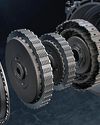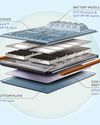
The mood at the Akurdi plant was distinctly nostalgic on June 10, the 84th birthday of Rahul Bajaj. The former Chairman of Bajaj Auto had passed away earlier this year and it was at this very plant 50 years ago when the iconic Chetak scooter first rolled out.
“We have always joked that Chetak was his favourite son so I would like to assume that he must be very happy right now,” said his son and Managing Director, Rajiv Bajaj. This was a special occasion because it marked the rollout of the Chetak all over again, albeit in its new electric avatar.
The company had launched the scooter in 2019 but Akurdi is now its new home under the aegis of Chetak Technology. It was the best tribute one could pay to Rahul Bajaj who truly paved the way for affordable mobility with the scooter decades earlier. Bajaj Auto stopped manufacturing scooters many years ago and turned its focus to motorcycles but the revival of the Chetak is a clear acknowledgment that brands never die.
For Rajiv Bajaj, the event brought back a whole lot of memories. “On a more practical note, it is also an important day for me because this production shop, known as the scooter assembly shop, was where exactly I started work on December 19, 1990,” he reminisced.
As he put it, his “first day, first show” was in this very production shop which was way different back then. This was also the place where he met some of the most important people in his life. Bajaj recalled a list of names who were present on the occasion and laughingly added that they were, like him, old furniture who had been around for decades.
This story is from the 15th June 2022 edition of Autocar Professional.
Start your 7-day Magzter GOLD free trial to access thousands of curated premium stories, and 9,000+ magazines and newspapers.
Already a subscriber ? Sign In
This story is from the 15th June 2022 edition of Autocar Professional.
Start your 7-day Magzter GOLD free trial to access thousands of curated premium stories, and 9,000+ magazines and newspapers.
Already a subscriber? Sign In

Spain's Fersa Group invests in India-based Delux Bearings
Besides theRs100 croreinvestment, the Indian company gets access toadvanced technologies and bearings with arange of applications that willhelpinits global growth strategy, writes Manobhava Baruah.

Tata Autocomp to open compact dual-clutch transmission plant
Amidthe country’s growing need for personal mobility with easy manoeuvrability, comes the demand for vehicles with automatic transmission. Tata AutoCompisready tomovein writes Shruti Mishra.

Pankaj Munjal-backed Hero Motors raises equity from GEF Cap
The company willinvest Rs1,500 crore over thenextthree years andit expects 60 percent ofits turnover to come fromelectric vehicle parts. Itaims to becomea Global EV Solutions Company from India

New age thermoplastics for next-generation EV batteries
Saudi-based global materials major SABIChas developed cutting edgein fire-resistant polymers and flame-retardant materials that comply with various EV battery safety standards across the world.

Switch Mobility to meet growing e-bus demand with fresh capex
Oncourse for abillion-dollar business, the company is exploringa possibility of operating satellite factories across the country to serve different geographies, write ShahkarAbidi and Ketan Thakkar.

Kia India to invest Rs 2,000 crore in EVS, to introduce new e-RV in 2025
New investmentto drive R&D, infrastructure development and manufacturing capabilities. The company willlocally produce EVsin India with possibility of exports as well, writes Mayank Dhingra.

"The government has given enough time for indigenisation but the industry has not taken it seriously"
Amitabh Saran, Founder and CEO, Altigreen, shares his views on problems inthe EV industry and battery localisation solutions with Amit Vijay M.

TATA MOTORS SEES ONE INTWO CARS SOLDAS EVS BY 2030
The company aims to offer wider choices withnew EVs that may straddle a pricebracket of Rs20to 40lakhinthe coming years, writes Ketan Thakkar.

MG Motor India in expansion drive, to invest $100 million
The investment willbe usedtoramp up existing production capacity from1.2to1.4-15lakh units per annum atthe automaker's Halol plantin Gujarat, writes Ketan Thakkar.

"Technology and its multiplier effect are driving business transformations and customer experiences"
Technical Centre India is one of Continental’s largest research and development centres in the world, andasa Centre of Competence’ it also develops customised products for the BRIC countries.